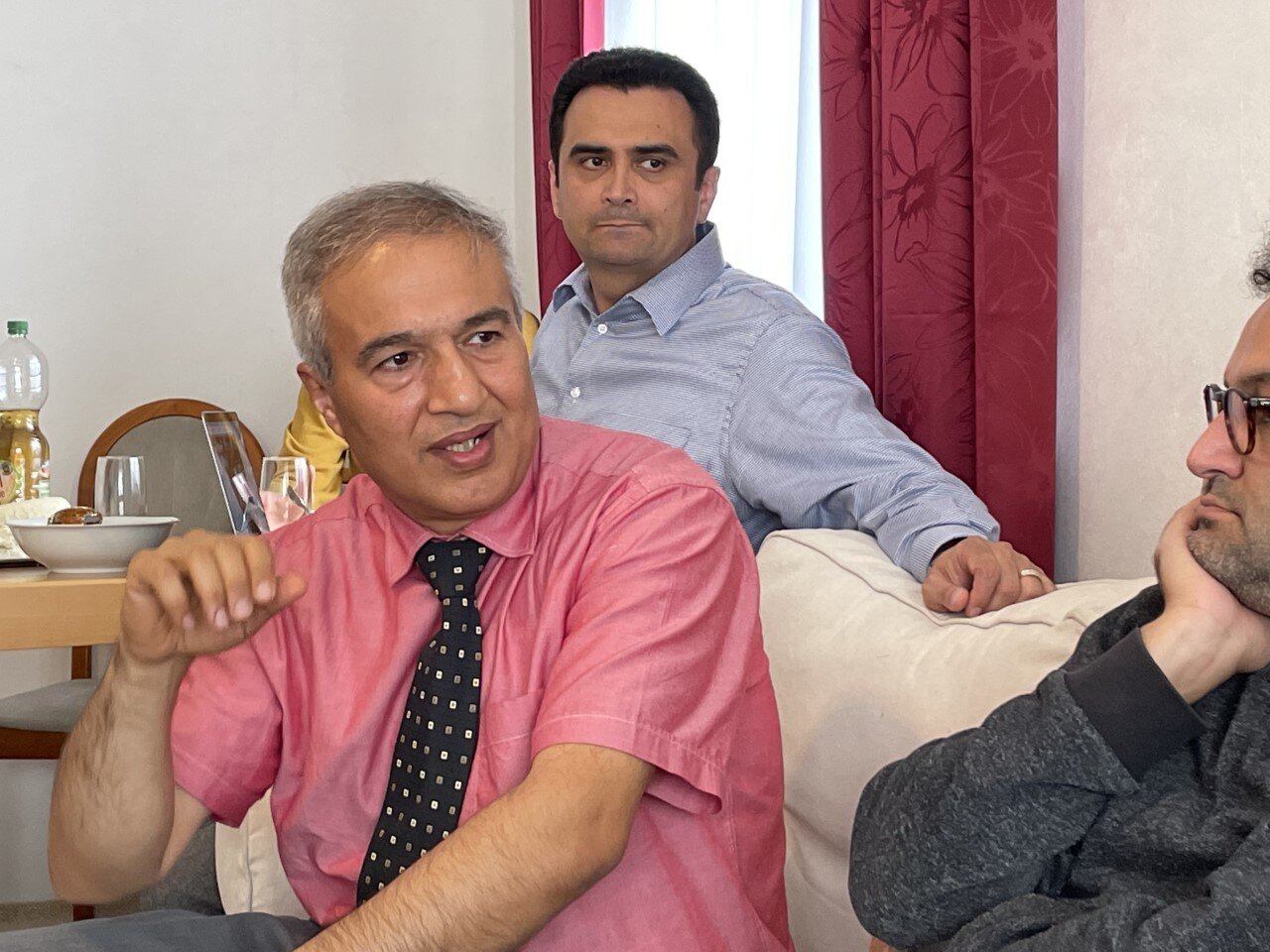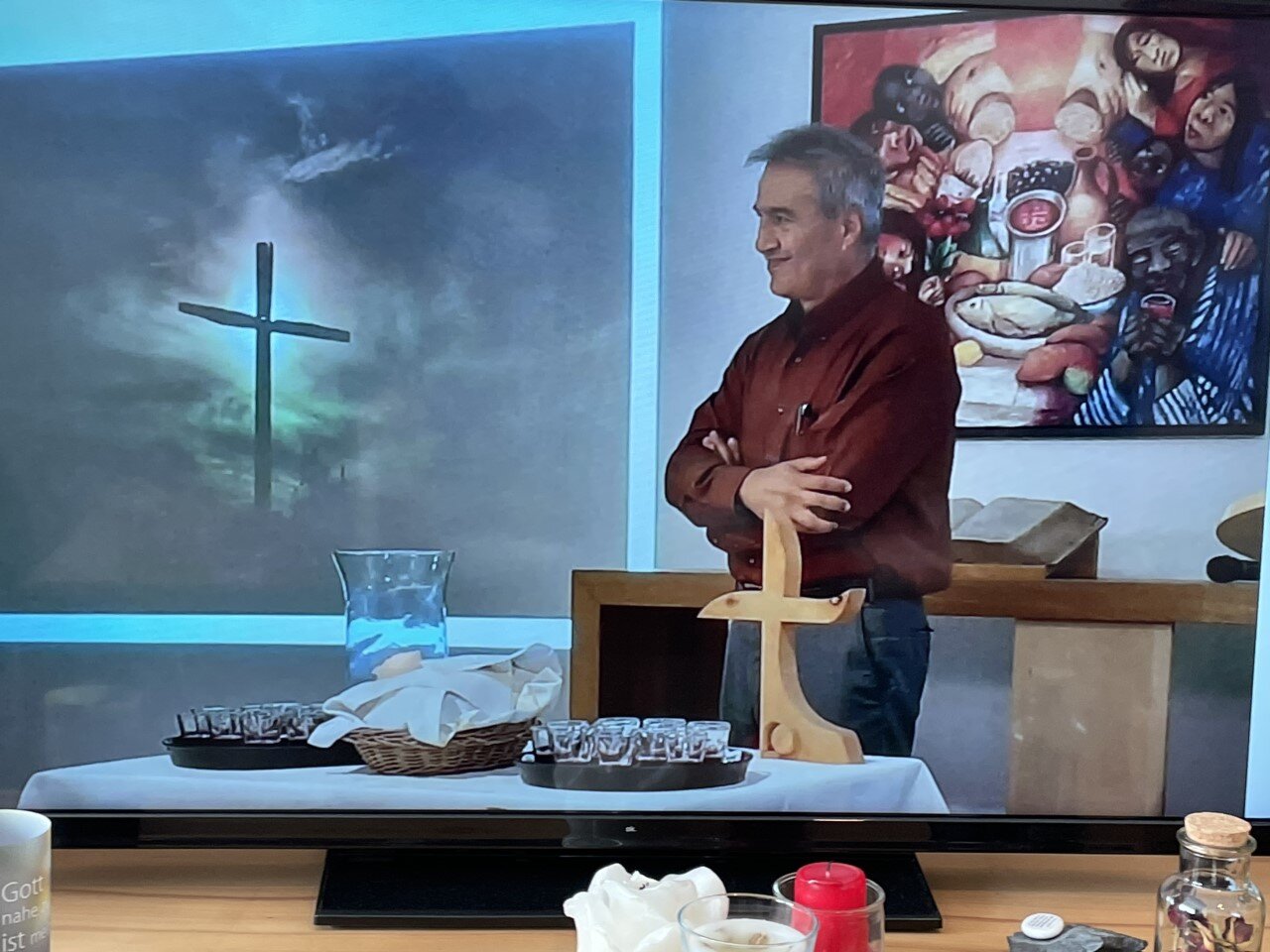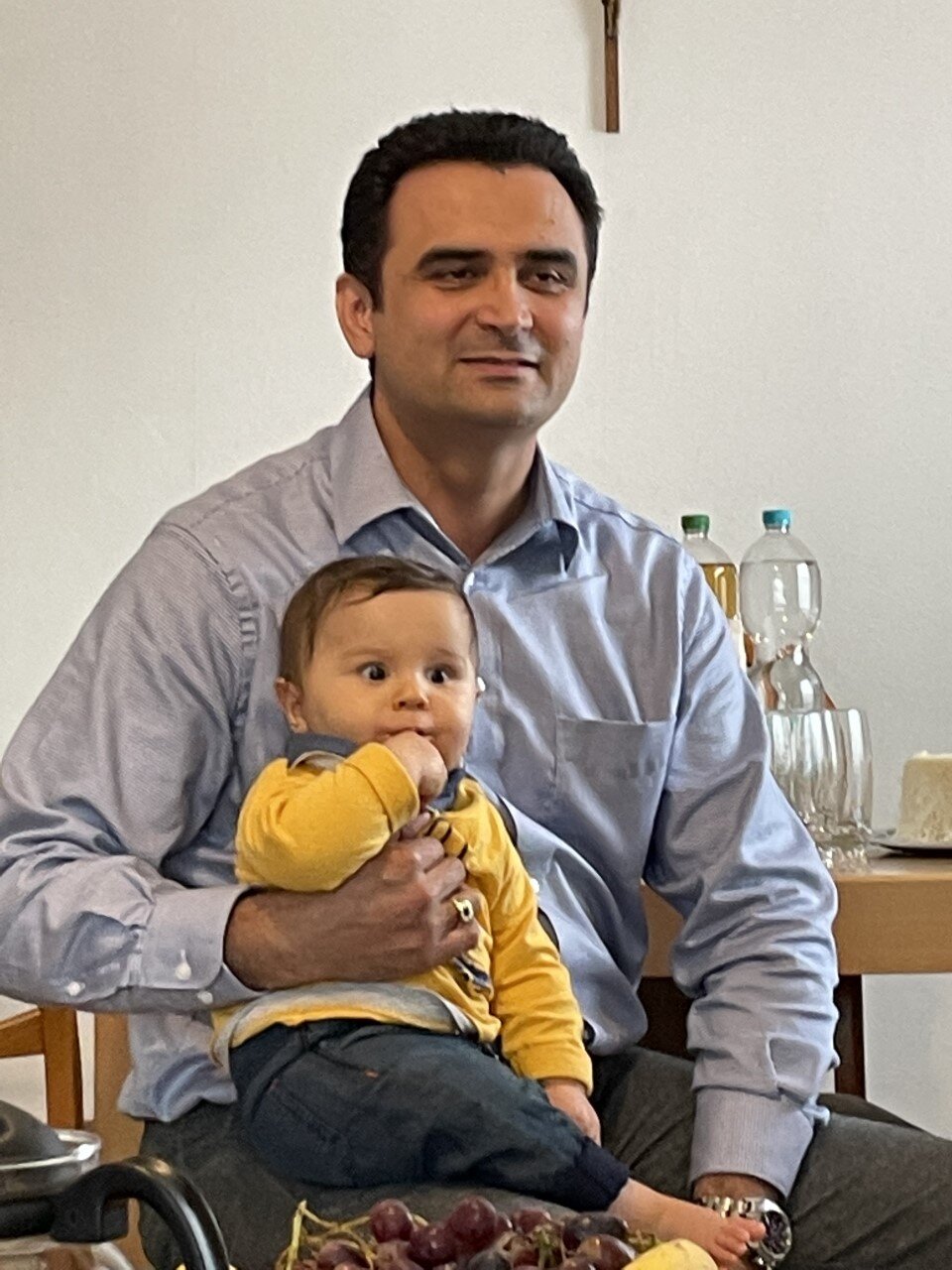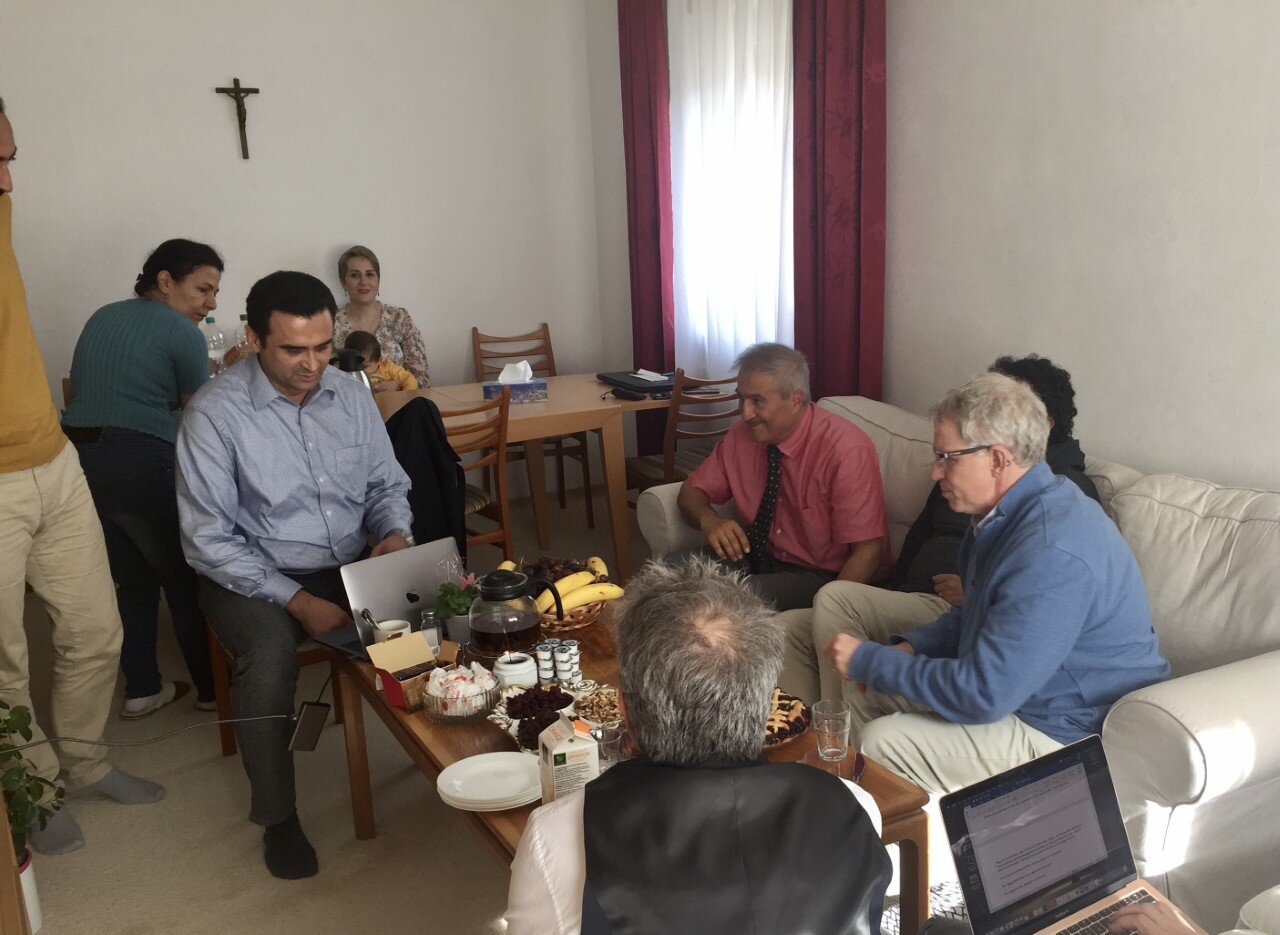Europe #5: The Great Awakening
by Caryl Weinberg
Each day so far, we have been steeped in Iranian Christian love, faith, and courage. But today was filled to the brim. So, this post is just part of a day I’ll call “The Great Awakening.”
After meeting with yet another young Iranian couple this morning, we left the hotel for a three-hour drive to Nuremberg. After wrestling with the GPS, we arrived to a very warm welcome by Rev. Dr. Sargez Benyamin and his wife Annette, as well as another couple from the church. We were immediately blessed with fresh figs, a special cake, and a few other items along with tea. All of which were very welcome after the journey. Soon we were joined by Pastor Mehrdad Sajadi, his wife, and two precious children, at which point we sat down to a meal of rice (two kinds), salad, olives, chicken, fish, meatballs in sauce, and a special Iranian stew with greens and meat. And all of it was presented with great artistry as well and, of course, finished with coffee and more tea. We were right at home.
Both Rev. Sargez and Pastor Mehrdad are missionaries of The Antioch Partners, (TAP), a close partner of The Outreach Foundation. Though they have only been partners with TAP for about eight months, they both said it was important to them that they are part of a wider body of missionaries from all over the world. And that they are both challenged and cared for by TAP, hoping to be connected to churches in the U.S. and beyond to partner with them.
Rev. Sargez started the conversation with a slide, titled “The Great Awakening.” In it, speaking as a professor and tutor at PARS seminary in Iran, historian of the Presbyterian Church in Iran as well as the General Secretary of that same Presbyterian Denomination, and now Moderator of the Synod of the Diaspora, he laid out the history of the church which was founded in Urmia region in 1834. It grew and spread in Iran with Presbyteries of Armenian, Assyrian, and Farsi-speaking people. The Farsi-speaking churches are those that were for the Muslim Background Believers. Those were the most sensitive churches and were only barely tolerated by the government until some years ago. But churches were planted and they grew. When Rev. Sargez became the denominational leader, he spent much time on rebuilding and revitalizing the churches so that they became active and alive again. And though Assyrian himself, he chose to lead the Farsi congregation in Tehran; something that gave him joy, but also put him under more scrutiny by the government. In the end, though he didn’t want to leave, he and his family did: first to the U.S. until he sensed a strong call to Germany where he pastors now. At this time there are Iranians in some 90 German Evangelical Free churches throughout Germany. And he once again is pastoring a group of Muslim Background Believers (MBB), 74 now, but growing all the time. He and Pastor Mehrdad now hope to form a Presbytery of Iranian Churches in Germany as they look to support and disciple groups and leaders in the diaspora in Europe and beyond.
Pastor Mehrdad came from a Muslim background but became a Christian after reading the New Testament. He quickly became a leader in the Emanuel Presbyterian Church in Tehran, but could never be ordained because of having a Muslim background. The government would not have tolerated it. He couldn’t be baptized for five years and only did that with great risk to himself and Pastor Sargez. Fear did not stop them. In 2012, Pastor Mehrdad was arrested. In solitary confinement for 66 days, he said he had lots of time with God. But he couldn’t understand and asked God again and again, “why am I here? If I am serving you faithfully, why am I in this situation?” Pastor Mehrdad was transferred to a public prison of 700 men, some murderers, some thieves, and some like him – for following Christ. It was in that dark place that God used him in ways he couldn’t imagine. He met another Pastor there and they started meeting to pray every day. They also had a Bible smuggled in disguised as a Quran. When they – in their room of 40 men - were seen and heard by these other men, four of them, two murderers including a serial killer, one thief, and one man who read the Quran for the prison every day through Mehrdad, came to Christ. These men who would never leave the prison alive, all met Jesus because Mehrdad was there, in that dark place- the place where God had sent him.
Pastor Mehrdad left the prison, more committed than ever to serve Christ. But when the government no longer tolerated churches with the MBB, he left the country to move to Germany. He started serving voluntarily, a group of Persian Speaking Christians in Homberg, but eventually was called to serve a church of Afghans in Munich. Under his leadership, Persian (Farsi) speakers have also joined the church, and it is growing and thriving with both sets of people worshiping together as one body.
In addition to pastoring, Pastor Mehrdad teaches and preaches, has weekly discipleship classes, serves as a translator for Iranians in a German congregation, serves the wider diaspora through workshops and seminars in places where there are no pastors including other places in Europe. He loves the church and has the passion and skills to develop leadership at this critical time when more Afghans and Iranians are coming to Europe. The church must be ready.
Tomorrow will give you all a glimpse of how vibrant these young churches with new believers are. But reflect on this. Was the “Great Awakening” that Rev. Sargez referred to in his slide, talking about the beginning of Christianity in Iran, the growth of the church in Iran, or now the many Muslims in the diaspora coming to Christ? May the Lord help us to see through His eyes and even the eyes of these faithful servants here in Germany.




